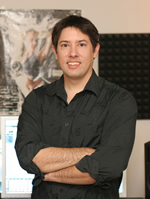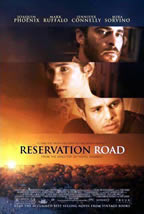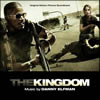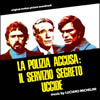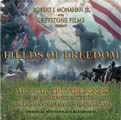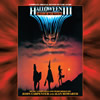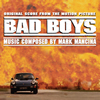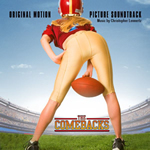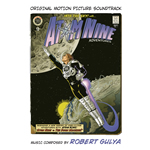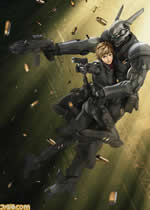Randall D. Larson's SOUNDTRAX
|
Soundtrax
October 22, 2007
Soundtrax Interview: Cris Velasco Visits Clive Barker’s Jericho
Composer Cris Velasco had already made a name for himself with his energetic videogame scores for God of War and God of War II, but if they hadn’t solidified his stature as a gamescorer to be reckoned with, his latest effort, for Codemaster’s new First Person Shooter (FPS) game, Clive Barker’s Jericho™, surely will.
Clive Barker’s Jericho is an interactive experience that mingles the darkest elements of Barker’s horror fiction with an ambitious, age-spanning story aimed at mature gamers, fans of Clive Barker and horror fiction enthusiasts. Hand picked for Clive Barker’s Jericho by none other than Barker himself, Cris Velasco has composed a haunting choral and cinematic orchestral score that enhances the game’s epic, paranormal horror experience.
“Cris Velasco’s music for Clive Barker’s Jericho is exquisite,” stated Barker. “Filled with yearning, dark energy, threat and redemption, it is the unstoppable engine in the terrifying ghost train of Jericho.”
Velasco has enjoyed considerable recognition for his prior work in videogames, including top honors from the Academy of Interactive Arts and Sciences for “Outstanding Achievement in Original Music Composition,” GameSpot’s “Best Original Music Award,” IGN’s “Best Original Score Award,” and G.A.N.G.’s “Music of the Year.”Soundtrax recently interviewed Cris Velasco about his approach to scoring Clive Barker’s Jericho.
Q: How have your previous game scores prepared you for this latest project?
Cris Velasco: Each project prepares me for the next one simply because I can add that extra experience into my bag of composing tricks. Working on huge games such as God of War also gives me the confidence to take on other giant titles. This is true from the developer’s point of view as well. They feel like there’s less risk involved in hiring me perhaps.
Q: How has Jericho differed from your experiences on scores such as God of War, etc?
Cris Velasco: Jericho was different in one major way from these other games – I was getting to work with my friend and creative inspiration, Clive Barker. This initially put a lot of self imposed pressure on me. But with a looming deadline that soon wore off and I just tried to do my best to write music that followed the story and worked within the game.
Q: What was your musical inspiration for scoring Jericho? What elements of the film (or its makers) influenced your choice of how to score it?
Cris Velasco: Jericho is an original story that was created by Clive Barker specifically as a game. I’d love to see a film made from this someday but for now it exists only as a video game. Clive Barker and I had a series of meetings in regards to the style of music I’d be writing. He has a tremendous knowledge of music so it was very easy for us to sit down and discuss his intentions. Lots of things were mentioned but the ones that really stuck out were the use of late 20th Century aleatoric type writing, like Ligeti or Penderecki, and music of an almost religious nature. The combination of these two styles working in unison turned out to have a very creepy effect.
Q: How does the Jericho score make use of its music during ongoing game play versus the game's cinematics, and how have you integrated the music for these different segments
Cris Velasco: The cinematics are integrated very well into the game play. The placement feels very natural and they exist solely to expand upon the narrative. The music for these cut scenes is not really that different from the game play. It’s all about pushing the story forward. Even though a lot of the music during game play is relatively specific to what’s going on at the time, I’m always conscious of the overarching story line.
Q: The game travels between dark horror and age-spanning adventure. How have you used music to enhance both the epic-laden excitement of the game's story and the darker aspects of its horror quotient?
Cris Velasco: I treated the music as more of a film score for this game. A lot of game music tends to score things as independent events. Here’s the music for killing orcs, here’s the music for killing trolls, here’s the music for walking through the forest, etc. With Jericho, while there are definitely those same kind of moments, I tried to pay more attention to Clive’s overarching story line. The trick was to try to find a common thread throughout the game and then base the score around that event or figure.
Q: Does the game seek to frighten as well as excite its players? What works for you in crafting horror music in a game such as this?
Cris Velasco: Yes, the game is quite exciting. But of course has its share of frights too. For the most part I left the game play and visuals to scare the player. I haven’t relied too heavily on the typical musical stingers to make the players jump. What I tried to do instead is just create an atmosphere of unease with the music. It never really lets the player feel calm. In some places I’ve even written very melodic and beautiful music to accompany truly grotesque imagery on the screen. This has really given a few of these scenes an extra disturbing effect I think.
Q: How did Clive Barker come to select you to score the game – and how closely did you work with him on establishing the game's musical mood, style, and placement of music? How much input did he, or the other gamemakers, have on the music you wrote?
Cris Velasco: I’ve known Clive for some time now. When I first heard that he was doing Jericho I immediately got in touch with Clive to let him know I was interested. Clive agreed that I was the right person to score this and so he personally requested me to Codemasters. After I was officially signed on Clive and I had a series of conversations about the music as I stated above. It was a great experience to collaborate with him. His knowledge and love of music is so great that I left knowing exactly what he had in mind for Jericho.
Q: How would you describe the score's orchestration? How did you integrate orchestra and choir and electronics to achieve such a dynamic and effective sound on Jericho?
Cris Velasco: Most of the score was produced right from my own studio with samples. However, I was able to record a live choir and boy soprano at Skywalker Sound. Choir is one of the things we felt would be crucial to the score to help humanize the characters and give life to the story. It’s just not possible to do this with a fake choir. I also have some really cool live orchestral effects in my own personal library that helped bridge the gap between sampled orchestra and live choir. Other than that, it’s a pretty straight forward ensemble that I’m using. I’ve just used the orchestra a bit non-traditionally at times to give Jericho a unique sound.
Q: How has music for computer games evolved over the last seven years since you've been an active part in it? What do you think the future holds for game music?
Cris Velasco: There’s a saying that loosely goes, “great music will never make a bad game great. But bad music can make a great game bad.” As games get more and more sophisticated, music starts to play a bigger role. There’s real thought going into the audio engines and the implementation of music that wasn’t there before. Writing music for games is becoming an even bigger challenge these days in order to make the experience even more immersive for the player. I’m also seeing an unprecedented number of games having their scores recorded live now. Now that games are becoming more respected and recognized as an art form, this can only be good news for the music.
For more information on Cris Velasco, see: www.monarchaudio.com
For more information on Clive Barker’s Jericho, see: www.jericho-game.com
This Week’s Recommendations
Lakeshore Records has released Mark Isham’s latest score, for Terry George’s new dramatic thriller, Reservation Road. The film, which stars Joaquin Phoenix, Jennifer Connelly, Elle Fanning, Mark Ruffalo, and Mira Sorvino, deals with loss and grief, revenge and redemption as two families each cope with the loss of a child. Isham’s music adopts a minimalist rhythmic ambiance that is dominated by keyboard, winds, and synths. The score is darkly tinged, with a severe ambivalence of low synthnotes, rumbling tones, and electronic shards of sounds in low register. The tonality is appropriate and key to musically validating the emotions director George carefully instilled into his film. In his Director’s Note in the CD book, George describes how Isham told him that he didn’t want the obvious in this score – no overblown sentimentality or schmaltz. “He wanted to experiment with sounds and tones,” George writes. “He wanted to underlay musical themes that subtly – a word that Mark Isham owns – heightened the fears and the rages or four tormented souls.” Isham accomplishes this brilliantly in the score to Reservation Road. As he did so hauntingly in his score to Crash – a score whose equally honest emotions are impossible not to call forth in comparison – Isham deftly lifts the skein of the film’s surface and engages its branching subtexts, its nuances of character and emotion and hidden torment. The music becomes a character in the film, a presence whose breath colors the characters and their experiences, subliminally elevating them to a higher level of understanding as we watch their interactions develop. As he does so well, Isham invokes the film’s soul in his music, and the result, in film and on CD, becomes its own sonic ecosystem, grafting onto the film a musical psychology that is painfully reflective, delicately and hauntingly beautiful, and intensely powerful in its fragile, emotive influence.
www.lakeshorerecords.com
Dario Marianelli (V for Vendetta, The Brave One) has crafted one of his most beautiful and emotionally charged scores for the British drama Beyond The Gates, known outside the USA as Shooting Dogs. MovieScore Media has released the original soundtrack album in both digital download and CD format, featuring Marianelli’s orchestral score in conjunction with a number of African songs performed by the Chorale de Kigali and the Voices of Kicukiro in Rwanda. The movie, starring John Hurt, Hugh Dancy and Dominique Horwitz, is veteran director Michael Caton-Jones’ very strong film about the horrendous genocide in Rwanda in 1994, where 800,000 people were killed in 100 days. Marianelli, who is no stranger to this genre having scored Michael Winterbottom’s much acclaimed In This World in 2002, says that the music had to connect with the story in “a very direct and truthful way.” While doing research for the score, Marianelli discovered that at the time of the genocide a lot of Tutsis were listening to the songs of Cecile Kayirebwa, who had become the voice of their plight. “The power of the images, and of the truth behind them, was crying for something simple and direct, and I thought that if I could find the right kind of woman’s voice, it could have a very direct emotional impact,” Dario Marianelli explains. Marianelli also describes, in the CD’s liner notes, how he incorporated a recurring pattern that wafts throughout the score, something between a heartbeat and a ticking clock, to suggest the foreboding inevitability of events once they are set in motion. The score lays down a very emotive atmosphere of haunting inevitability and heartbreak, the voices serving to comment upon the inhumanity saturated upon the Rwandan people by these events. It’s a very organic score, almost entirely acoustic, with an overall resonating sensibility that is as earthy as the film’s African landscape and as prone to bleeding as the dark-skinned personalities who people much of that landscape. Significantly “Remember Us” is only the second-to-last score on the CD: Marianelli’s concluding track is titled “We Turned Our Backs” and suggests, with softly sung voices, sorrowful strings, and that beating percussion pattern, that we ought not simply to remember the victims of this slaughter, but that in our unwillingness to intervene, we too may share some of the blame.
www.moviescoremedia.com/beyondthegates.html
Showcasing an original musical score by Golden Globe Award-winning composer Alexandre Desplat (Hostage, The Queen, The Painted Veil) the soundtrack to Ang Lee’s new film, Lust, Caution, has been released by Decca. The film, based on the short story by revered Chinese author Eileen Chang, is a startling erotic espionage thriller, set in WWII-era Shanghai, about the fate of an ordinary woman who gets swept up in a dangerous game of emotional intrigue with a powerful political figure. Asian cinema icon Tony Leung stars as the political figure, Mr. Yee, while Tang Wei, a rising star in mainland China, makes her feature film debut as the young woman, Wong Chia Chi. The score captures an evocative beauty through the use of piano, harp, a large string section, and the occasional sampled flute and is crafted around character-based atmospheres, embodying human nuances much more than it suggests setting or time period. Desplat seems to be suggesting the duality of innocence and desire, contentment and power, honesty and subversiveness. Contrast, for example, the gentle innocence inherent in tracks like “Wong Chia Chi’s Theme,” which tenderly captures the woman’s innocence and naivete, with the succeeding track, “Desire,” a far darker motif, suggestive of her more fleshly yearnings. This thematic duality will continually rise up in the score; for example, the cue “Tsim Sha Tsui Stroll” are playful and carefree, music for public handholding and shoulder rubbing; “Moonlight Drive” gets a little more intimate with its stimulating intertwined violin melodies; while “The End of Innocence” is far more provocative in its suggestive cadence and substantial erotic allure. “Nanjing Road” proffers a deep, undulating cello pulse that suggests dark motivations (director Ang Lee, incidentally, plays the piano on this track), while “The Angel” embodies an airy piano melody above rapturous violin accompaniment. Other cues, such as “Sacrifice,” “Remember Everything,” and the softly wailing mysterioso of “Check Point,” evoke the dangerous political realms in which Chia Chi’s attraction to Yee will lead her. Desplat’s score is both inherently commentative upon the story and its character interactions, and extremely expressive musically; it makes for a thoroughly rewarding soundtrack CD.
www.deccalabelgroup.com
Decca has also released the soundtrack for Elizabeth: The Golden Age, featuring a unique and compelling musical collaboration by Craig Armstrong (Moulin Rouge, The Quiet American, Ray) and India’s A.R. Rahman (Provoked, Water, Warriors of Heaven and Earth). The movie was directed by Shekar Kapur and welcomes back the Award-winning, star-studded cast from the first installment of the historical adventure, 1998’s Elizabeth (scored by Australian composer David Hirschfelder), including Cate Blanchett, Geoffrey Rush and Clive Owen. Armstrong and Rahman bring a dynamic collaboration to the score that complements this epic story; where Hirschfelder provided a pop-imbued yet period-sensitive score somewhat based on classical works of the16th Century era of Queen Elizabeth I, Armstrong and Rahman provide a rich, epic-styles tapestry that does not cling to period or musical historicity, but evokes a strong orchestral passion. The score opens with a powerful statement from orchestra and choir, rising in power and emphasis, the melody riding an eloquent cadence in a musical equivalent of widescreen and vistavision. The score occasionally reaches similar peaks, but more often remains more intimate, inducing poignancy, eloquence, and, of course, pageantry. The score sparkles with acoustic instrumentation, including a wonderfully airy use of female voice in “Bess and Raleigh Dance” – and less airy but no less provocative use of voice in “Mary’s Beheading.” The unusual pairing of Armstrong and Rahman – essentially merging Western and Eastern musical influences to accompany a film about distinctly British iconography, works splendidly. The score, as it turns out, isn’t about either ethnic musical idiom – the score in fact is very Western-styled – but is about honor and loyalty and dedication as embodied by one very powerful yet vulnerable woman seeking to do right by her crown and secure her position as a beloved icon of the western world. The score embraces and embellishes these elements and crafts together an excellent musical accompaniment that works as well for its more intimate moments, such as “Walsingham Death Bed,” as it does for its action sequences, such as the large-scales “Battle” with its choir and thickly-hewed orchestra. The score is powerful and sentimental, with a slight mystical air that evokes as much the mythology the surrounds this Queen as it supports her very real and human personage – the latter perhaps best captured in the bold confidence of “Horseback Address,” reprising the stalwart opening theme.
Danny Elfman’s latest score, The Kingdom, has been released by Varese Sarabande. It’s a much darker and more industrial sounding score than we’re perhaps used from the red-headed maestro. The film is a heavy-hitting actioner about a team of FBI agents investigating the bombing of an American facility in the Middle East. Elfman’s score is primarily electronic – lots of synths and samples and guitars and percussive beats. The score opens with the title track, a claustrophobic conglomeration of riveting metallic percussion – steel drums heavier metals banging and being whapped – and an undulating rhythm of keyboards and sampled riffs, layered synths and steam-driven sonics all mired into an effective mixture of post-modernistic controlled rhythmic dissonance. An strident electric guitar solo supports more intimate reflections of emotion, heard in “Waiting,” “Digging Deep,” and “Finale,” although the score’s main emphasis is on fairly raucous riff and rhythm, beaten out with a militant aggression. The music seems to embody the sound of the American industrial might and the emphasis is upon this quotient of the film (there is no music, at least none captured on the soundtrack CD, reflective of the Saudi people or locale in which the film’s story takes place); it a cogently hostile score, adeptly supportive of the film’s straight-ahead action sensibility.
www.varesesarabande.com
Luciano Michelini’s catchy score for La polizia accusa: il servizio segreto uccide (aka Chopper Squad, Silent Action), is among the latest batch of rare Italian film scores released by Digitmovies. The 1975 film is a politicized police thriller starring Tomas Milan, Luc Merenda, and Mel Ferrer, directed by Sergio Martino (his sophomore effort following Milano trema, la polizia vuole giustizia). Michelini (whose tremendous sci-fi horror score for L'Isola Digli Uomini Pesce came out earliest this year from Sweden’s Fin De Siecle Media) has crafted a modernistic orchestral score that is melodic, pop-etizing, and sufficiently noirish for a Euroaction thriller like this. An electric band is also featured along with the symphonic ensemble as the score rotates between serving up dramatic orchestral melodies and laying down electric guitar patterns. The score opens with a distinctly Italian police-movie style, very much along the lines of Morricone’s Violenza Quinto Potere, with an insistently propulsive and percussive ostinato from piano doubled by drums over a down-ward bowed recurrence of violins. The second track introduces a light love theme for flute or piano over violins, again, very Morricone-like, and very pretty. The bulk of the score is derived from a variety of suspense motifs, building an effective musical miasma with which to accompany scenes of investigation, danger, and other scenes that built a prelude to action. A somewhat grotesque march for horn and strings over snare drum recurs a few times also; it takes on an almost madcap, tongue-in-cheek swagger in several variations. It’s an effective action thriller score in a distinctly Italian style, nicely preserved for the first time in any form; the Digitmovies release includes fifteen tracks of original soundtrack music, plus another ten tracks consisting of outtakes and alternate takes not used in the film. www.digitmovies.com
World Soundtrack Awards winners announced
The World Soundtrack Awards winners were announced last Saturday at Ghent International Film Festival in Belgium. The first prize went to Alexandre Desplat, this year’s Film Composer of the Year. Clint Mansell’s film music for The Fountain not only received the Best Original Soundtrack of the Year but also the Public Choice Award.
The 7th edition of the World Soundtrack Awards was again a big success. The Flemish Radio Orchestra, conducted by Dirk Brossé, performed top quality film music for a sold out concert hall. Both the ceremony and the concert were hosted by world famous composers such as David Arnold, Alberto Iglesias, Clint Mansell, Maurice Jarre and Daniel Tarrab.
The winners:
Film Composer of the Year
Alexandre Desplat )
Best Original Soundtrack of the Year
The Fountain (Clint Mansell)
Best Original Song Written Directly for Film
You Know My Name (Casino Royale) written by Chris Cornell and David Arnold – Performed by Chris Cornell
Discovery of the Year
Daniel Tarrab and Andres Goldstein (XXY, Inheritance)
Public Choice Award
The Fountain (Clint Mansell)
The Lifetime Achievement Award went to Mikis Theodorakis who unfortunately couldn’t be present due to health problems.
The Best Young Belgian Composer prize was awarded to Werner Viaene. He wrote the best score for Belgium, The Movie by Wim Robberechts and won € 2.500.
The World Soundtrack Awards are organized in cooperation with Sabam, the province East-Flanders, and the Ghent City Marketing Fund.
6th Annual Film Music Conference Next Week
The sixth annual Hollywood Reporter, Billboard Film & TV Music Conference will take place November 1-2, 2007 at the Beverly Hilton Hotel in Los Angeles, CA. The conference is a “must attend” for the industry's most influential executive and creative talents, last year drawing over 500 attendees. The two-day event will feature sessions and panels on music for film, TV, Internet, gaming, commercials and other industry-related topics, as well as several live performances.
Among this year’s highlights is a Q&A with conference keynote speaker, renowned composer, Alan Menken. Known throughout the world for his compositions on both stage and screen, Menken’s scores include Little Shop of Horrors, The Little Mermaid, A Christmas Carol, and the upcoming Sister Act and Leap of Faith. His library of work has earned him seven Golden Globe’s, ten Grammy’s, and honor’s from the London Evening Standard, Olivier, New York Drama Critics, Drama Desk and Outer Critics Circle Awards.
For the first time this year, the second day of the conference will be dedicated to music supervision. The first day will cover a wide range of topics, and live performances by Grammy winner Jesse Harris - also participating in the Songwriter Spotlight Panel - Gavin Bellour, and Ill Scarlett. Other subjects include: how to prepare and submit music for projects, where to find music for a project, licensing, copyright issues in song placement, how technology – from MySpace, to FTP servers and music blogs – is changing things, and much more.
For more information, see: www.billboardevents.com/billboardevents/filmtv/index.jsp
Robert J. Kral on Superman: Doomsday
La-La Land Records is releasing the soundtrack from the animated feature Superman: Doomsday this week. Based on the award-winning Death of Superman comic book trilogy, the movie features a score by Robert J. Kral (TV's Angel, The Dresden Files and The Lost Room), who brings the Man of Steel to spectacular new heights with a score bursting with thrills, chills, and emotional drama. Featuring he voices of Adam Baldwin, Anne Heche, James Marsters, Swoosie Kurtz, and Cree Summer, Superman: Doomsday looks at what happens when LexCorps accidentally unleashes a murderous creature, one which ultimately takes the life of Superman. Villain Lex Luthor resurrects our hero unleashing a clone of Superman with all of his powers and none of his heart. When Luthor loses control of the clone of Superman who will save Metropolis?
Taking on the responsibility of Superman proved a super task for composer Robert J. Kral. He described, "At the outset, the thought of scoring for Superman Doomsday was not only an immense thrill but also something of a daunting prospect. Who hasn't heard of Superman?! While I was ecstatic over discovering I would write music for one of his biggest, most legendary adventures, I was also keenly aware of the responsibility at hand in scoring such an event."
Instead of recreating melodies that other composers used for the various incarnations of Superman, Kral created a brand new Superman theme. "When I wrote the new theme I went for what I'd call a bit more of the "man" and a touch less of the "super" - meaning I tried to convey that this battle and this adventure was going to require tremendous effort on the part of our hero," said Kral. "So much so that instead of complete heroics, we were going to feel his struggle, even his pain as he pushed beyond the evil raging against him."
www.lalalandrecords.com
Film Music News
Tribute Film Classics, the new label from John Morgan and William Stromberg dedicated to preserving the classic scores of the fast in newly recorded, large scale symphonic release, announces that its first two releases are available for pre-order. Mysterious Island is planned for release on November 11th, followed a week later by Fahrenheit 451/Twilight Zone: Walking Distance. Both scores feature William Stromberg conducting the Moscow Symphony Orchestra, with score restoration by John Morgan, Anna Bonn and William Stromberg. Both CDs will include Bernard Herrmann’s complete scores plus music and portions of cues that didn’t make the final cuts of he films. The second CD also includes a suite from the Twilight Zone episode "Walking Distance" arranged for full string orchestra.
For more details, see: www.bernardherrmann.org/news/recordings.xdoc
Trevor Jones' score for Fields of Freedom, lavishly performed by the London Symphony Orchestra, is now available on the CMMR label in very limited marketplaces. Fields of Freedom is a large-format documentary film being shown at the Gateway Center in Gettysburg, PA, and provides a 30-minute introduction to the Battle of Gettysburg's climatic action (the repulse of Pickett's Charge), told from the perspective of the soldiers who fought the battle. One cue from Jones’ impressive score, which also incorporates some traditional Civil War era melodies), was included on last year’s live CD recording from the 1st Soncinemad Film Music Festival; the new gift-shop-souvenir-type album has ten score tracks.
AHI Records presents the 25th Anniversary Collector's Edition of Halloween III: Season Of The Witch. The soundtrack features music composed & performed by director/composer John Carpenter and synthesist Alan Howarth (The Lost Empire, Headless, Escape from New York) for the 1982 horror film ghost-written by Nigel Kneale and directed by Tommy Lee Wallace. The original soundtrack LP for Halloween III was released by Varese Sarabande Records and has been out of print for many years. Alan Howarth's AHI Records, to be distributed by Buysoundtrax Records, presents the new soundtrack release which features all the contents of the original album release, newly remastered, along with thirteen tracks of previously unreleased music – nearly an hour of music in all. The booklet contains notes written by composer Alan Howarth. This is a limited edition release of 1000 units.
Click here for details
La-La Land Records is shipping their new release of the premiere recording of Bad Boys, Mark Mancina’s eagerly-sought action score from 1995. I got to write the liner notes for this release and I had a lot of fun exploring the nuances of this pulse-pounding and influential action score. Mancina’s music for this Michael Bay/Jerry Bruckheimer-Don Simpson movie shaped much of the action scoring of the ensuing decade. The release is a limited edition of 3000 units. www.lalalandrecords.com
Naxos of America has announced worldwide digital distribution of the Chandos Records catalog beginning October 1st. The catalog will be available through iTunes beginning October 1st until December 31st, and on other major digital music retailers including eMusic, Rhapsody and Napster beginning January 1, 2008. Chandos’ impressive artist roster includes a series of newly recorded compilations of classic film music from John Addison, Malcolm Arnold, Ron Goodwin, Clifton Parker, and other noteworthy British composers of the 40s, 50s, and 60s.
This week Milan Records releases the soundtrack to Rendition, New Line Cinema’s new political thriller starring Jake Gyllenhaal, Reese Witherspoon, Alan Arkin, and Meryl Streep and tells the story of a CIA analyst who questions his assignment after witnessing an unorthodox interrogation at a secret detention facility. Not without its subjectivities, the film is directed by Gavin Hood and reunites the director with the composing team that scored Hood’s provocative South African political thriller, Tsotsi, Paul Hepker and Mark Kilian. Milan’s soundtrack CD includes more than 50 minutes of music, combing the performance of a 50-piece string orchestra recorded in Burbank and a variety of Middle Eastern instruments recorded in Morocco. Vocalists MC Rai and Marissa Steingold also contribute to the score’s layered sound texture.
Christopher Lennertz has scored The Comebacks, a new comedy from the producers of The Wedding Crashers which stars David Koechner as a college football coach with the worst record in the history of the sport on a quest to turn his team around. In addition to his score, Lennertz recorded a song he produced and arranged, performed by Koechner. The score and the song are now available digitally on iTunes – it’s quite a cool and likable heroic/anthemic score that has a lot of heart as well. Sample soundbytes can he listened to via your iTunes Store.
Varese Sarabande will issue Mark Isham’s score for Lions for Lambs, Robert Redford’s politicized drama about opposing sentiments about war and consequences in Afghanistan, on Nov 6th. The tantalizing collaboration between Alexandre Desplat (The Queen) and Aaron Zigman (The Notebook) on Mr. Magorium’s Wonder Emporium, the latest family-oriented magical fantasy film starring Dustin Hoffman and Natalie Portman, will be released on Nov 13th. The film, about the strangest, most fantastic, most wonderful toy store in the world – where everything in it comes to life — including the store itself, is said to feature an enchanting score by the duo.
Hungarian composer Robert Gulya has composed a highly entertaining and exciting adventure score for the independent sci-fi movie Atom Nine Adventures, which is now available online from www.filmmusicdownloads.com. Featuring the Budapest Symphony Orchestra, Gulya's thematic score is written in a beautifully traditional swashbuckling style, inspired both by golden age composers such as Korngold and Rózsa, as well as postmodern icons like Jerry Goldsmith and John Williams. Robert Gulya's previous credits include the western Truce, the horror film The Boy Who Cried Bitch, and Hungarian comedy S.O.S. Love (the latter also available from filmmusicdownloads.com). Instead of rehashing well-known comic book superheroes, Atom Nine Adventures presents a completely new hero who must rescue the world from a technologically advanced villain who plans to take over planet earth. The film was recently screened at the Official Selection of the Shriekfest Film Festival in Los Angeles, where it won the award for Best Special Effects in a Feature Film. For more information, see the official Atom Nine Adventures web site at http://www.atomnine.com! Among many other things the exciting web site gives you a fascinating behind-the-scenes look at the scoring process.
Ridley Scott’s latest film, American Gangster, has been scored by German-born composer Marc Streitenfeld. The engagement marks Streitenfeld's seventh music collaboration and second score with Scott. Universal Pictures releases American Gangster on November 2nd. Island Def Jam releases the soundtrack album November 6th with tracks by Streitenfeld. Set in the Seventies, the crime drama follows a detective (Russell Crowe) who works to bring down the drug empire of Frank Lucas (Denzel Washington), a Harlem kingpin who smuggles heroin into the country by hiding it in the coffins of American soldiers returning from the Vietnam War. The dark film required a score to support the tension and drama, and Streitenfeld's approach was to use an 80-piece orchestra (recorded in sections), as well as numerous acoustic pre-records, mostly performed by Streitenfeld himself.
The soundtrack for the John Woo-produced anime, Appleseed Ex Machina, has been release in Japan by Rhythm Zone as a 2-CD/1-DVD package. Disc one features songs and tracks by various artists, while the second disc contains the original score by Tetsuya Takahashi. The limited bonus DVD contains trailers, music clips, live video clips, a making of music featurette, and interviews. The movie, released in Japan on October 20th is a sequel to the popular 2004 anime feature, Appleseed, and is directed by the same director, Shinji Aramaki, with Woo stepping in to produce.
Games Music News
Ubisoft’s highly anticipated videogame Assassin's Creed™ will be scored by British Academy Award winning composer Jesper Kyd, noted for his impressive scores for Freedom Fighters and the Hitman videogame series. The combination of Kyd’s epic orchestral compositions with acoustic, percussion and vocal performances delivers a deeply spiritual aesthetic with Hollywood flair.
"We listened to many composers before finding the right person for Assassin's Creed. Jesper Kyd [was] able to create epic historical pieces fused with both traditional medieval instruments and modern synth sounds," said Jade Raymond, the game’s producer. "For Assassin's Creed we wanted the score to capture the gruesome atmosphere of medieval warfare but also be edgy and contemporary. Jesper not only achieved this balance but also underlined the changes in gameplay and pacing in a way that immerses the player even further into the Assassin's Creed experience."
Each setting within the game has its own theme and distinct musical identity, ranging from the tragedy-stricken city of Acre to the proud stoic stronghold of Damascus to the powerfully spiritual and multicultural capital of Jerusalem. "I was inspired by the deep and engaging world of Assassin's Creed and working with the visionary team at Ubisoft Montreal was a fantastic experience," said Jesper Kyd. "It was truly refreshing to be given so much creative freedom for such a high profile blockbuster title and I believe we took it to the max."
For more information on the game, see: www.assassinscreed.comSumthing Else Music Works, Inc., through its licensing relationship with Microsoft Game Studios, will release the original soundtrack for the hit video game, Halo® 3, on November 20th. The original soundtrack features the game’s original music score in a 2-CD release that features the new symphonic compositions by Martin O’Donnell and Michael Salvatori, the award-winning composers behind the best-selling Halo: Combat Evolved, Halo 2 Volume One and Halo 2 Volume Two soundtracks. In addition to new original tracks written for the Halo 3 video game, the original soundtrack also includes new arrangements of the game’s musical themes that audio director and composer Martin O’Donnell recorded with a full live orchestra and chorus. The 2-CD set amounts to two hours of original music from the game.
Developed by Bungie Studios and published by Microsoft Game Studios, the critically acclaimed Xbox 360® exclusive, which was released worldwide on Tuesday, Sept. 25, is the fastest-selling video game ever and already one of the most successful entertainment properties in history. Halo 3 is the conclusion to the epic Halo trilogy and continues to explore the fates of the beloved protagonist Master Chief™ and his artificial intelligence sidekick Cortana as they struggle to save humankind from destruction at the hands of the alien coalition known as the Covenant.
For more information see www.halo3.comRandall Larson was for many years senior editor for Soundtrack Magazine, publisher of CinemaScore: The Film Music Journal, and a film music columnist for Cinefantastique magazine. A specialist on horror film music, he is the author of Musique Fantastique: A Survey of Film Music from the Fantastic Cinema and Music From the House of Hammer. He now reviews soundtracks Music from the Movies, Cemetery Dance magazine, and writes for Film Music Magazine and others.

